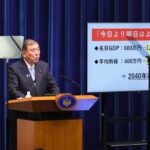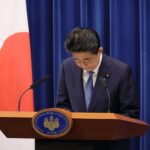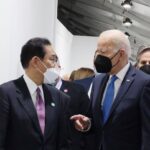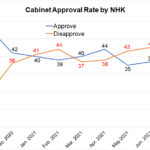At a press conference on September 7 at the Prime Minister’s Office, Prime Minister Ishiba Shigeru announced his intention to resign as president of the Liberal Democratic Party (LDP), citing the conclusion of his administration’s negotiations on US tariff measures as the reason for the timing. The LDP will hold a presidential election on October 4 to select a new president, after which the Ishiba cabinet will resign en masse and the Diet will hold an election to nominate a prime minister. However, because the ruling party is in the minority, it is unclear if the new president of the LDP will also become prime minister.
Background to Ishiba’s Resignation
In January 2024, as issues surrounding political donations and fundraising parties involving LDP factions grew, then-LDP President Kishida Fumio, feeling increasingly threatened, decided to dissolve his own faction. This did not resolve the political money issues, but it resulted in the dissolution of all factions except the Aso Taro faction. Kishida subsequently announced that he would not run in the LDP presidential election in September of that year and that he would step down as prime minister. Ishiba was a clean politician with no connection to this issue, and there was hope that he would change the LDP. However, despite his political experience, Ishiba lacked a strong base within the party. Nevertheless, he won the presidential election with Kishida’s support by clearly stating his intention to continue Kishida’s “virtuous cycle of growth and distribution” policy. The following October, he was appointed prime minister at an extraordinary Diet session. That same month, Ishiba’s LDP ran in the Lower House election. The LDP dissolved its factions and elected a new president but was unable to overcome distrust regarding politics and money. The LDP suffered a major defeat, losing its majority in the Lower House and becoming a minority government. The LDP suffered another major defeat in the Upper House election in July 2025, becoming a minority government there as well. These two defeats reduced the number of LDP Diet members from 368 to 295 (not including the Speakers of the Lower and Upper Houses). The LDP also suffered a major defeat in the Tokyo Metropolitan Assembly election held in June, just before the Upper House election.
Ishiba’s term as LDP president was due to end on September 30, 2027, but calls for him to take responsibility for these losses intensified. Furthermore, as Ishiba did not specify when he would step down, only saying he would “[decide to resign] at an appropriate time,” calls within the party for an early presidential election grew louder.
On September 2, the LDP executive committee decided that LDP lawmakers and local organization representatives must submit a signed document expressing their intention to seek an early presidential election by September 8. Requiring the submission of a signed document had been intended to discourage early party presidential elections, but instead sparked opposition within the party. Calls for early implementation grew to a majority, and the LDP began showing signs of internal division. In response, on September 7, the day before the September 8 deadline set for submission of the signed document, Ishiba decided to resign as LDP president and held a press conference.
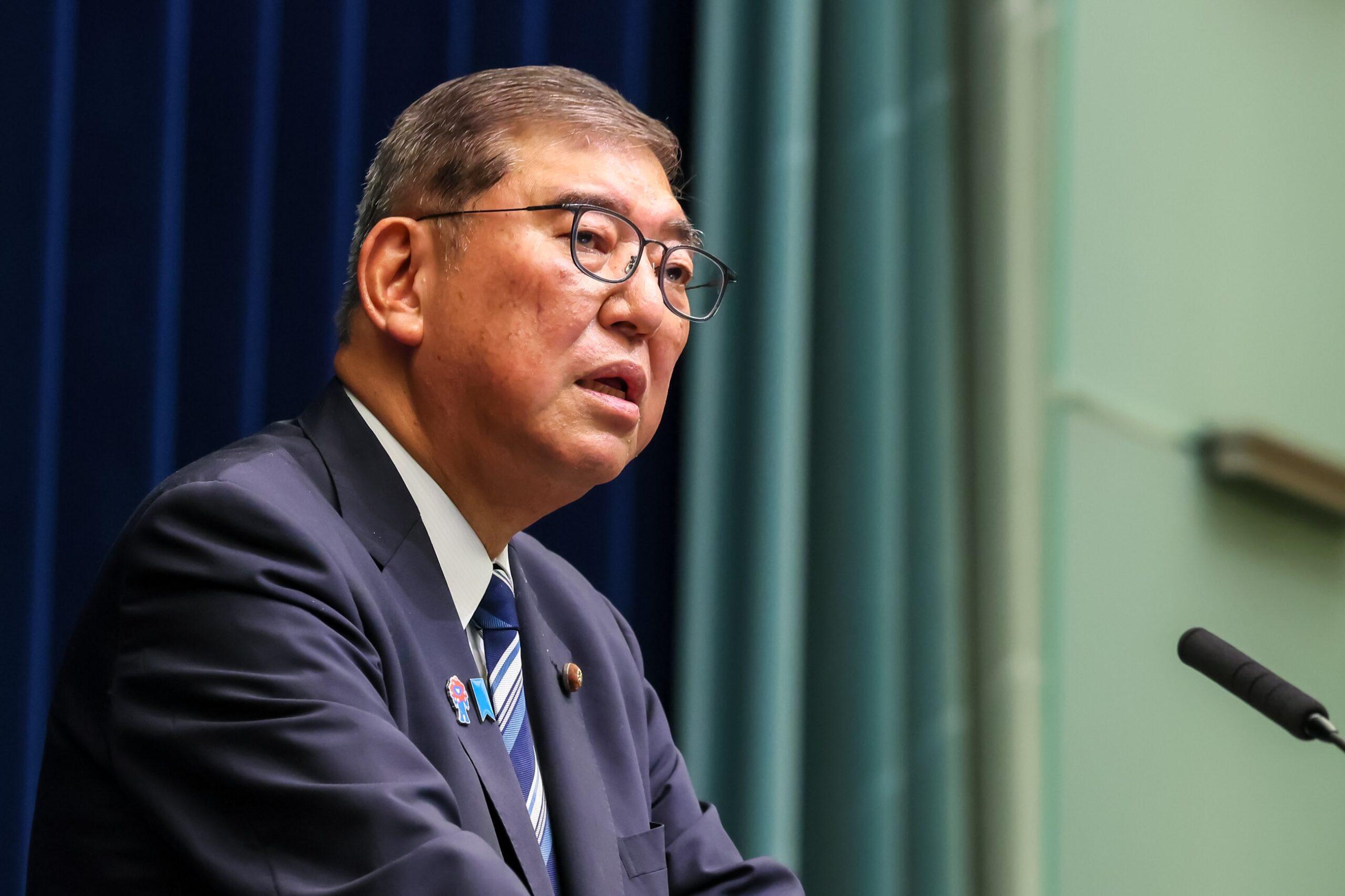
CAPTION
Prime Minister Ishiba Shigeru announced his resignation as president of the Liberal Democratic Party at a press conference on September 7, 2025. PHOTO: Cabinet Public Affairs Office
“An Appropriate Time”
Ishiba’s resignation was prompted by the signing of a Japan-US investment agreement and the issuance of a US presidential order on September 5. Though he had never explicitly stated when he would resign, Ishiba declared that this time, marking a turning point, was the “appropriate time.” He stated, “I have decided to step aside and make way for the next generation.”
The tariff negotiation agreement with the US had laid the foundation for ensuring economic security and accelerating economic growth. The stage for implementing the agreement was about to begin. However, Ishiba expressed regret, saying it was “deeply regrettable” that the Ishiba administration would not be able to complete its work at this stage.
Another issue Ishiba expressed regret over was the LDP’s political fundraising activities. The LDP’s summary of the Upper House election, compiled on September 2, clearly states that this issue “continues to be a major factor in eroding public trust and is an underlying undercurrent of distrust. The LDP must recognize and deeply reflect on this.” Ishiba has been working on this issue, including passing political reform bills by the end of 2024. However, he emphasized, “Even so, we have still not been able to dispel the public’s distrust of politics, including the issue of politics and money. This is my greatest regret. The LDP must draw a line under this.”
Furthermore, he expressed concern that if the LDP lost the public’s trust, Japanese politics could fall into easy populism. He then quietly but firmly stated, “If the public sees the LDP as unchanged, the LDP will have no future. We must achieve a true ‘dissolution-like start.’”
Ishiba added that he hopes the next LDP president and prime minister will implement policies related to tariffs, wage increases, and agricultural policy reform, and produce results.
Expanding the Coalition
Unless the Lower House is dissolved, the next elections for both the Lower and Upper Houses will be in 2028. Over the next three years, the LDP can maintain stable governance by successfully coordinating with opposition parties on each policy or by expanding the coalition and maintaining that framework. One of the key points in the LDP presidential election will naturally be whether the LDP can establish a stable government through coalition expansion. In fact, management under the Ishiba administration has been challenging over the past year. As a minority government, the administration sought cooperation from the opposition on each policy and incorporated their opinions. The administration passed 67 of the 68 bills submitted to the Diet, including the Cyber Response Capability Strengthening Act, and ratified all 13 treaties. Ishiba emphasized this as the result of “careful deliberations,” but it is important to note that concessions to the opposition increased the size of the bills’ budgets.
Regardless of the form of the coalition government moving forward, the way policies are decided will be crucial. The focus of the extraordinary Diet session this fall and the regular Diet session beginning in January of next year will be the criteria coalition parties use to agree on policies. Even if an expanded coalition is formed, the LDP will have to accept its new coalition partner’s demands to prevent them from leaving. The focus will likely then shift to infighting within the coalition.
Public Opinion
An NHK opinion poll (conducted September 5–7) showed that the cabinet’s approval rating rose one point from the August survey to 39%, while the number of people who “disapproved” fell three points to 42%. The support rates for political parties were as follows: the LDP was at 27.9% (down 1.5% from the previous month), the Constitutional Democratic Party of Japan (CDPJ) was at 5.0% (down 1.9% from the previous month), the Japan Innovation Party (JIP) was at 3.6%, the Democratic Party For the People (DPFP) was at 5.7% (down 1.4% from the previous month), Komeito was at 3.1%, Sanseito was at 6.3%, Reiwa Shinsengumi was at 1.7%, the Japanese Communist Party (JCP) was at 2.9%, the Conservative Party of Japan was at 1.8%, the Social Democratic Party was at 0.8%, Team Mirai was at 0.4%, and 34.8% said they did not support any particular political party (up 5.2% from the previous month) (only differences of 1.0 or more from the previous month are shown in parentheses). The Cabinet’s approval rating was 39% and the LDP’s approval rating was 27.9%. In other words, the results of the “Ishiba administration” at 39% and the “LDP at 27.9%” show, on one hand, the public’s distrust of the LDP.
Furthermore, when asked about the future form of government, 44% chose a coalition government between the LDP and Komeito with opposition parties cooperating on individual policies, 24% chose a coalition government between the LDP and Komeito and some opposition parties, and 17% chose a coalition government between the opposition parties. In other words, 68% want a government run by some form of opposition cooperation centered on the LDP and Komeito rather than the opposition parties. As many experts have pointed out, the current opposition parties lack a sense of responsibility, and their governing capabilities are questionable. These opinion poll results are consistent with that assessment. Unfortunately, the opposition parties have not developed into responsible ones, and the public has no expectations of them, especially regarding foreign policy and security.
The LDP presidential election will be announced on September 22, with voting taking place on October 4 to determine the new president. Due to concerns about a political vacuum, it was decided that, instead of a short, simplified process, the election would be conducted on a large scale, combining votes from Diet members and party members nationwide. A simplified process would give the impression that the people are not present. To revitalize the party, the LDP opted for a full-scale process that listens to its members’ voices.
Conditions for the New LDP President
A sense of relief spread throughout the LDP in response, as the worst-case scenario of a party split had been avoided. The party quickly entered presidential election mode.
However, according to reports, on the night Ishiba announced his resignation, Saito Tetsuo, leader of Komeito, which is in a coalition with the LDP, told reporters, “We have no idea who will be running for office at this point. For Komeito, though, a coalition government must be formed with someone who shares our conservative-centrist principles and aligns with our ideology. Otherwise, we simply cannot form a coalition government.” This comment was interpreted as a warning against the LDP electing a right-wing candidate. Some believe that Sanseito’s gains in the Upper House election were due to right-wing LDP supporters voting for that party. There are forces within the LDP that are trying to win back lost support by nominating a specific candidate.
The opposition parties will be watching closely until the next LDP president is chosen. The new president is likely to be elected prime minister in the next election. The opposition has also become multiparty. Furthermore, Edano Yukio, founder of the CDPJ and a former vocal supporter of changing the government through opposition cooperation, has stated that the era of opposition cooperation is over, which is symbolic. Opposition unity is in doubt.
On September 8, the Nikkei average stock price reached a temporary peak, closing at 43,643.81 yen, as the widespread view emerged that Ishiba’s resignation signaled an end to political stagnation. Considering the multitude of domestic and international issues, the most important thing will be whether the new president can establish a party-wide system and an expanded coalition to ensure the stability necessary for policy implementation. If the new prime minister cannot do so, the well-being of the people may be overlooked in the struggle for leadership between the ruling and opposition parties, which could further weaken Japan’s national strength.
In summarizing the aforementioned Upper House election, the LDP cited one of the reasons for the defeat as the party’s measures to combat rising prices not resonating with the public, citing the fact that “the decision to provide cash payments was made just before the election, and the party as a whole was unable to adopt a unified stance or system to explain the situation to the public, and was unable to adequately counter the opposition’s straightforward argument for tax cuts.”
In elections, the public tends to focus on immediate issues, such as rising prices and social security. The more politicians try to address these issues, the more likely they are to resort to populism, which leaves future generations behind. We must not forget that the goal is to achieve fiscal reconstruction and economic growth without repeatedly resorting to stopgap measures, such as handouts. This is not limited to the LDP.
Mizuno Tetsu is a freelance journalist.

